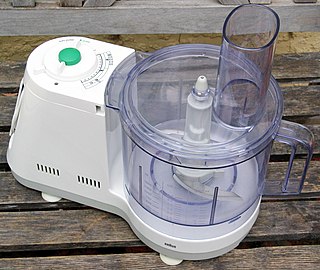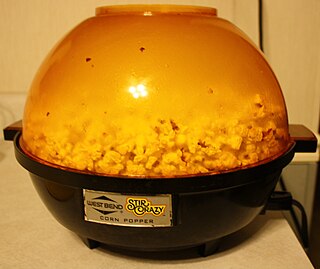
A small domestic appliance, also known as a small electric appliance or minor appliance or simply a small appliance, small domestic or small electric, is a portable or semi-portable machine, generally used on table-tops, counter-tops or other platforms, to accomplish a household task. Examples include microwave ovens, toasters, humidifiers, food processors and coffeemakers. They contrast with major appliances, such as the refrigerator and washing machine, which cannot be easily moved and are generally placed on the floor. Small appliances also contrast with consumer electronics which are for leisure and entertainment rather than purely practical tasks.

A home appliance, also referred to as a domestic appliance, an electric appliance or a household appliance, is a machine which assists in household functions such as cooking, cleaning and food preservation.

A blender is a kitchen and laboratory appliance used to mix, crush, purée or emulsify food and other substances. A stationary blender consists of a blender container with a rotating metal blade at the bottom, powered by an electric motor that is in the base. Some powerful models can also crush ice and other frozen foods. The newer immersion blender configuration has a motor on top connected by a shaft to a rotating blade at the bottom, which can be used with any container.
Krups is a German kitchen appliance manufacturer. It is part of the Groupe SEB. It is named after its founder, Robert Krups.

A food processor is a kitchen appliance used to facilitate repetitive tasks in the preparation of food. Today, the term almost always refers to an electric-motor-driven appliance, although there are some manual devices also referred to as "food processors".
Sunbeam Products is an American brand that has produced electric home appliances since 1910. Its products have included the Mixmaster mixer, the Sunbeam CG waffle iron, Coffeemaster (1938–1964) and the fully automatic T20 toaster.
Hamilton Beach Brands Holding Company is an American designer, marketer and distributor of home appliances and commercial restaurant equipment marketed primarily in the United States, Canada, and Mexico, including blenders, mixers, toasters, slow cookers, clothes irons, and air purifiers.

Mr. Coffee is a registered trademark of Newell Brands. The Mr. Coffee brand manufactures automatic-drip kitchen coffee machines, as well as, other products. The brand was founded in the early 1970s. Mr. Coffee has often been referenced in popular culture and has been promoted by celebrities such as Joe DiMaggio and Dave Kovack.
Cuisinart is an American home appliance brand owned by Conair Corporation. The company was started in 1971 by Carl Sontheimer to bring an electric food processor to the U.S. market. The "Food Processor" was the first model, introduced at a food show in Chicago in 1973. The name "Cuisinart" became synonymous with "food processor." It is also a portmanteau of "cuisine" and "art."

West Bend Housewares, LLC, based in West Bend, Wisconsin, produces household appliances such as breadmakers, mixers, coffee urns, slow cookers and woks. The West Bend Company, founded in 1911, was owned by Regal Ware Inc. but was sold to Vernon Hills, Illinois based Focus Products Group which took the name West Bend Housewares.
Morphy Richards is a British brand of electrical appliances headquartered in Swinton, in South Yorkshire, England. Its products were formerly made at its historic home of Mexborough, and in other facilities across the United Kingdom. However, since the 1990s, all of its manufacturing is now carried out in the Far East.

The Magic Bullet is a compact blender sold by Homeland Housewares, a division of the American company Alchemy Worldwide, and sold in over 50 countries. It is widely marketed through television advertisements and infomercials and sold in retail stores under the "As seen on TV" banner. A feature-limited retail version not under this banner called the "Magic Bullet Single Shot+" is also available.
Russell Hobbs is a British manufacturer of household appliances. Formed in 1952 by William Russell and Peter Hobbs, it became the primary kettle maker in the United Kingdom marketplace in the 1960s. Subjected to many corporate acquisitions through its history, its head office is currently sited in Failsworth, England, but it no longer manufactures its products in the UK, having moved its manufacturing operation to East Asia.
Breville Group Limited or simply Breville is an Australian multinational manufacturer and marketer of home appliances, headquartered in the inner suburb of Alexandria, Sydney. The company's brands include Breville, Kambrook and Ronson. In the UK and Europe the company goes to market as the Sage brand and as the Breville brand in the rest of the world.

Stanley is an American brand of food and beverage containers invented by William Stanley Jr.
In the 19th century Białystok was an important center for light industry and was the reason for the substantial growth of the city's population. The tradition continued with many garment factories established in the 20th century, such as Fasty in the district of Bacieczki. However, after the fall of communism in 1989 many of these factories faced severe problems and subsequently closed down.
Metal Ware Corporation is a company located in Two Rivers, Wisconsin and manufactures small kitchen appliances primarily marketing them under the NESCO and American Harvest brand names.

Assistent is a household kitchen appliance, introduced by Electrolux in 1940.
L G Hawkins & Co Ltd was an England based company which manufactured small electrical domestic appliances. The company was founded by Leonard George Hawkins in 1913 in London. Initially Leonard George Hawkins imported domestic electrical products from the USA under the ‘Universal’ brand name.










